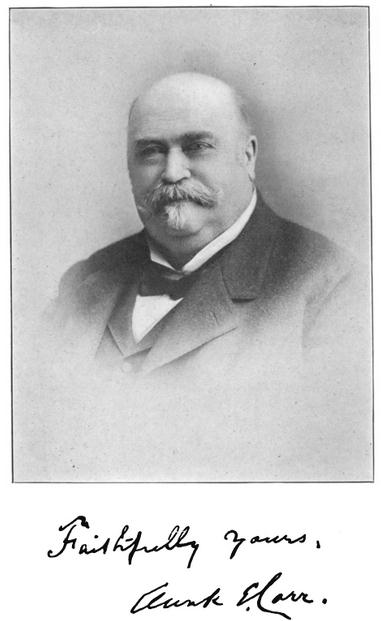February 3

The Colonel
by Barbara Schock
Carl Sandburg
delivered the Republican-Register newspaper to
a house at 560 North Prairie Street in
Galesburg during the 1890s. The owner, Clark
E. Carr, often met him at the door to take
possession of the day’s paper. Young Sandburg
knew Colonel Carr was an important person
through his reading of the Galesburg
newspapers.
In his autobiography
Sandburg described Clark E. Carr as
roly-poly–round from front to back and top to
bottom. Carr seemed to accept his corpulence
and was willing to laugh about it with his
friends.
Carr was born in Boston
Corners, New York, on May 20, 1836, the son of
Clark M. and Delia Torrey Carr. His mother
died when he was three years old. The elder
Carr then married Fanny LaYau. The family
settled in Galesburg in the fall of 1851. The
14-year-old Clark attended Knox Academy and
then Knox College for two years. By the age of
twenty-one he had graduated from law school
and established a practice with Thomas
Harrison.
Abraham Lincoln
appointed Carr postmaster of Galesburg in
March, 1861. For the next twenty-four years
every succeeding Republican president
continued to appoint him. It was a respected
position in the community and reflected his
status as a leader in local politics.
During the Civil War
Governor Richard Yates appointed Carr to his
staff and gave him the rank of colonel. Carr
encouraged people to call him “colonel” ever
after. His Civil War duties consisted of
organizing new regiments, visiting soldiers in
the field and accompanying sick and wounded
soldiers back to Illinois. Carr never led
soldiers into battle.
Carr waited until he
was thirty-seven years old to marry Grace
Mills on New Year’s Eve, 1873. They had two
children, Julia C. born in 1876 and Clark
Mills born in 1878.
Colonel Carr was active
in the economic development of Galesburg from
the end of the Civil War until the late 1880s.
He invested in the first gas plant which
provided street lights in the city. He
purchased the Register and edited it for
several years. When he sold the newspaper it
was combined with the Republican.
Carr played an
important role in convincing the Atchison,
Topeka and Santa Fe Railroad to build its line
to Chicago through Galesburg in 1887. Local
citizens raised $60,000 as an incentive and
Carr used his influence with the Board of
Directors to seal the deal.
In 1889 President
Benjamin Harrison appointed Carr to be Envoy
Extraordinary and Minister Plenipotentiary to
Denmark. As ambassador he encouraged the
lowering of tariffs on American food products
such as corn and pork. He was well liked by
the king and government ministers of the
country.
Before the Carrs returned to Galesburg they began planning for a new residence on Prairie Street. Architect William Wolf created a mansion with Danish architectural elements. The house contained twelve rooms, including six bedrooms and two bathrooms (the first abode in the city to contain such a feature). There was a ballroom on the third floor. The Carrs were well known for their entertaining. The house became a source of pride to the residents of the city. It was pictured on postcards sent to all manner of places. It was an excellent example of Galesburg’s economic success.
 |
He twice indicated his availability for the Republican gubernatorial nomination, and later for the district congressional seat, but was unsuccessful. He was also considered for a United States senatorial seat, but the General Assembly selected another.. In the decades after the Civil War, political candidates were more successful if they were veterans and members of the Grand Army of the Republic. Membership in the organization required combat experience. Carr didn’t meet that criterium even though he had served Governor Yates’ administration. Carr took defeat with good cheer and continued to be a strong supporter of the Republican Party.
Late in life, Carr wrote several books and became president of the Illinois State Historical Society. He died February 28, 1919.